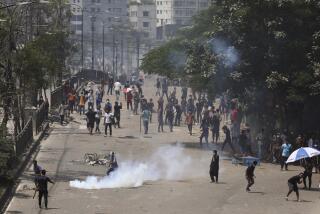Bahrain sentences activists to life in prison
Reporting from Cairo — Bahrain sentenced eight prominent activists to life in prison Wednesday in the latest crackdown on a 5-month-old rebellion in the island monarchy that has been criticized by international human rights groups for mass arrests, torture and shooting of protesters.
The verdicts by a military court follow the lifting of martial law but indicate that the ruling Sunni Muslim family will not tolerate unrest from the majority Shiite Muslim population, which is demanding an end to discrimination. Several of the activists, such as Abdulhadi Alkhawaja, are revered dissidents and their imprisonment is likely to spur fresh anger.
Arab news media reported that hundreds of protesters clashed with police near Pearl Square in Manama, the capital. It was the largest rally in weeks, and the government appeared to move swiftly to contain the violence before it spread to outlying villages, where security forces have camped for months.
The sentences came a week before government officials were expected to meet with Shiite leaders at the urging of the U.S., which is calling for an end to abuses against the protesters, who were inspired by revolutions in Tunisia and Egypt.
The U.S. Navy’s 5th Fleet is based in Bahrain, and activists have criticized Washington for not pressuring King Hamed ibn Isa Khalifa to stem the repression, which has killed at least 32 people and resulted in hundreds of arrests since February.
In Washington, State Department spokesman Mark Toner expressed concern about the severity of the sentences and the use of military courts.
“We continue to urge the Bahraini government to abide by its commitment to transparent judicial proceedings, conducted in full accordance with Bahrain’s international legal obligations, and to create the conditions for a meaningful, inclusive and credible dialogue,” he said.
Those receiving life sentences include activist Abdul Jalil Singace and Hassan Mushaima, a prominent Shiite political leader, who, like many Bahrainis, returned home from self-exile after assurances by the royal family that reform was coming and activists would not be persecuted. The men were charged with plotting to overthrow the monarchy.
Thirteen other dissidents were sentenced to between two and 15 years. One of them, Ibrahim Sharif, a Sunni Muslim and leader of the secular Waad party, was sentenced to five years for supporting Shiite protests for wider constitutional rights. Shiites make up about 65% of the population.
“When the sentence was read out, Abdulhadi Alkhawaja spoke loudly and said the people will continue in their struggle for their rights,” the Bahrain Center for Human Rights said in a statement. “He was beaten and removed from court; his family fears for his health as he was already suffering from the fractures in his face.”
Bahrain has accused protesters of being agents of foreign powers, especially Iran. The royal family quickly turned the demonstrations into a proxy struggle of Bahrain and its ally Saudi Arabia against Shiite-led Iran. Saudi Arabia, which also fears pro-democracy movements are upsetting the region’s balance of power, sent troops into Bahrain to help quell the revolt.
Demonstrations involving tens of thousands of people in Manama were crushed in March. However, sporadic protests have since occurred in villages and city neighborhoods still under heavy police control.
Times staff writer Paul Richter in Washington contributed to this report.
More to Read
Sign up for Essential California
The most important California stories and recommendations in your inbox every morning.
You may occasionally receive promotional content from the Los Angeles Times.











